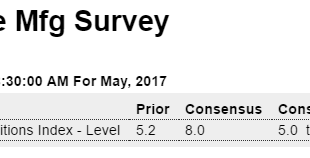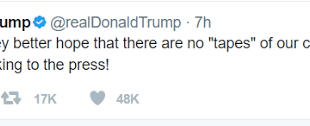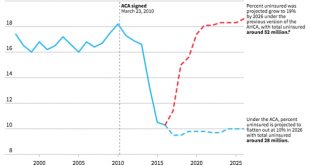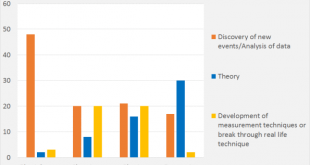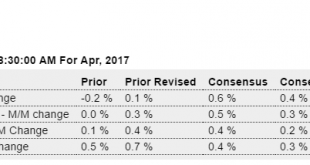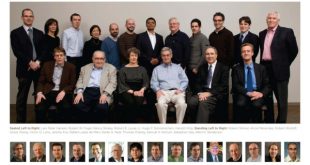Trumped up expectations reversing? Highlights Activity in the New York manufacturing region is flattening out this month following a run of unusually strong growth. May’s Empire State index came in at a lower-than-expected minus 1.0 with new orders also moving into the negative column to minus 4.4. Unfilled orders, which were very strong in April and March, also moved below zero to minus 3.7. But the strength in prior orders is keeping production up, at a very solid plus...
Read More »The “Tapes” Threat
by Sandwichman The “Tapes” Threat This may be so obvious it needs no explanation — but allow me to explain. This tweet puts on notice anyone who has a conversation with the POTUS that whatever they say MAY be recorded and selectively “leaked” for the purpose of blackmail, extortion and/or intimidation. That should be an effective strategy for ensuring candid, confidential communication and advice. Mitch McConnell and Paul Ryan may be too stupid to realize...
Read More »Models and measurement in economics: Wesley Mitchell in 1946
Noah Smith is not the first one to be puzzled by the rift between theory and measurement in economics. He states: “econ seems too focused on “theory vs. evidence” instead of using the two in conjunction. And when they do get used in conjunction, it’s often in a tacked-on, pro-forma sort of way, without a real meaningful interplay between the two. Of course, this is just my own limited experience, and there are whole fields – industrial organization, environmental economics, trade – that I...
Read More »Where’s the productivity growth? The Bureau of Labor Statistics can’t find the robots!
from Dean Baker Source: Bureau of Labor Statistics. We hear endless stories in the media about how the robots are taking all the jobs. There was a new rush of such stories after the release of a study by Daron Acemoglu and Pascual Restrepo, which found that robots were responsible for a substantial share of the job loss in manufacturing in the last decade. (For example, this Bloomberg piece by Mira Rojanasakul and Peter Coy.) However, there remains a very basic problem in the robot...
Read More »Curb your enthusiasm: Macron is just the beginning of a new fight for France and Europe
from Mark Weisbrot The media response to the French election reads like some people had too much cannabis. From the first paragraph of a front page news analysis of the New York Times: “It was globalization against nationalism. It was the future versus the past. Open versus closed.” Let’s not get carried away. It’s great that Marine Le Pen, whose National Front party with deep racist roots that go back to French collaborators during the Nazi occupation, as well as French colonialism, was...
Read More »Crimes against humanity
from David Ruccio As regular readers of this blog know, I am no fan of the way healthcare is currently organized in the United States. The U.S. healthcare system, as it is currently configured, only really works for those who make a profit—selling health insurance, pharmaceuticals, and in-patient and acute-care services in hospitals—and those who have the wherewithal to finance their own healthcare. But Republican plans to repeal the Affordable Care Act, aka Obamacare, and replace it with...
Read More »Is there a mismatch between theory and measurement in economics?
The ‘The Sveriges Riksbank Prize in Economic Sciences in Memory of Alfred Nobel’ has much more often than the prizes for physics, Chemistry and physiology and medicine been awarded for: theory. It was on a regular basis awarded for analysis of data or the discovery of new events but in these cases ‘discovery’ was contrary to the other sciences much less important than analysis. It was only rarely awarded for the development of measurement techniques. I’m preparing what might become a...
Read More »Retail sales, Business inventories and sales, Inflation
A bit weaker than expected, prior month revisions about a wash. Highlights Retail sales did recover in April but not as much as expected, up 0.4 percent overall and up 0.3 percent excluding autos which both miss Econoday’s consensus estimates by 2 tenths. Core readings are likewise soft, up 0.3 percent ex-auto ex-gas which misses the consensus by 1 tenth and up only 0.2 percent for the control group where a 0.4 percent gain was the call. Vehicle sales rose 0.7 percent in...
Read More »What happens when a small and dangerous sect captures the teaching of economics
from Lars Syll The fallacy of composition basically consists of the false belief that the whole is nothing but the sum of its parts. In the society and in the economy this is arguably not the case. An adequate analysis of society and economy a fortiori can’t proceed by just adding up the acts and decisions of individuals. The whole is more than a sum of parts. This fact shows up when orthodox/mainstream/neoclassical economics tries to argue for the existence of The Law of Demand – when...
Read More » Heterodox
Heterodox

